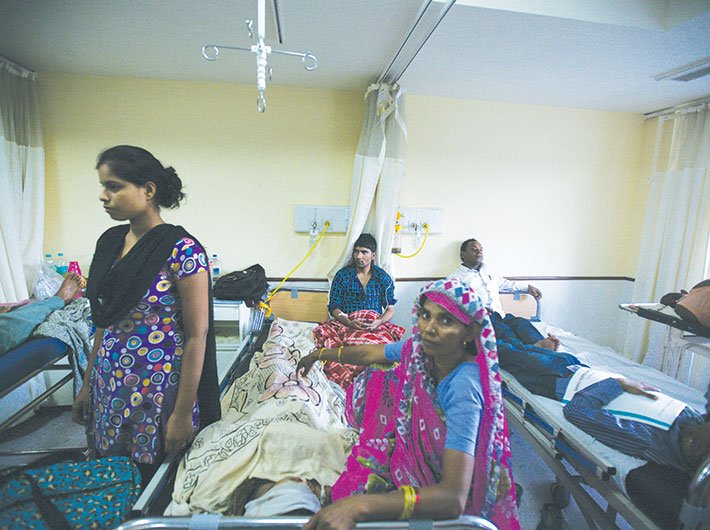India has joined a global experiment which deploys bacteria that can stop transmission of the virus
Bill and Melinda Gates Foundation CEO Sue Desmond-Hellmann and Melinda Gates in April volunteered to get bitten by the dengue causing Aedis mosquitoes in Indonesia. They were donating blood to rear these mosquitoes for the Eliminate Dengue Programme (EDP), an international, non-profit research collaboration led by the Monash University, Australia. These mosquitoes carried a bacterium called Wolbachia and it was important to help multiply their numbers. For these mosquitoes once infected with Wolbachia were found to be resistant to the dengue virus. And if they bit a dengue-infected person, they would still not become carriers of the dengue virus.
This unique project using Wolbachia microbe to fortify the Aedis mosquito against the dengue virus is the brainchild of an Australian researcher, Scott O Neil. He decided to use an unorthodox method to deal with the dengue virus. Instead of getting rid of the dengue carrying Aedis with ointments and fumes and nets, he decided to multiply their numbers. But the mosquitoes he bred were infected with a unique bacterium called Wolbachia. Wolbachia which occurs in 60 percent of insects has been found to stop the spread of the dengue virus. And it spreads fast among those it infects. If an infected insect mates with an uninfected female, the eggs would all be infected and if an infected female mates with an uninfected male the eggs would still be infected. So it was found to be a powerful tool to fight dengue, the publicity documents of the EDP explain.
The Indian Council of Medical Research (ICMR) tied up with Neil and the Monash University in February this year to replicate the Wolbachia project in the country. India was the sixth country to join the programme, which is being implemented in Australia, Brazil, Colombia, Indonesia, and Vietnam. Field trials are on in many countries and cities with community involvement.
Shane Fairlie, spokesperson for the EDP, explained to Governance Now how Wolbachia can help fight dengue and also be a weapon against Zika, chikungunya and yellow fever.
“It works to interfere with the transmission of a broad range of pathogens spread by the same mosquito, the Aedes aegypti, including dengue, Zika, chikungunya and yellow fever.” The reason for its effectiveness, she said, was that “Wolbachia has quite a broad-based effect within the insect and it works in two ways. The first way is that it boosts the natural immune system of the mosquito to make it harder for it to support the Zika or dengue infection.
If the mosquito can’t get infected, then it can’t transmit it to people. The other way it works is by competing with key molecules like cholesterol, which both the virus and Wolbachia need in the mosquito and when Wolbachia is there, it essentially consumes those molecules and makes it harder for the viruses to grow. Again, if the viruses can’t grow, they can’t be transmitted.”
Many countries have had the Wolbachia experience. Asked about side effects of being bitten by a Wolbachia-infected mosquito, Fairlie said: “Years of laboratory and field-based research have concluded that mosquitoes with Wolbachia are safe for people, animals and the environment. People who are bitten by an Aedes aegypti mosquito carrying Wolbachia will not notice any difference.”
In March 2016, the World Health Organisation convened a Vector Control Advisory Group (VCAG) to review options for mosquito control in response to zika. The group issued a statement, which recommended pilot deployments of the Eliminate Dengue Programme’s Wolbachia method, according to Fairlie.
The project which has started in India is at its initial stages and the goal is to familiarise the local strains of Aedis mosquito with Wolbachia.
Scientists at ICMR are all set to begin the trials in India. Dr Manju Rahi, a scientist at ICMR, said, “Laboratory trials have taken off at the Vector Control Research Centre at Puducherry. What is planned is a laboratory-based study to characterise the Aedes aegypti strain with Wolbachia. The strain that has been developed by Prof Scott O’Neill’s team from Australia will be established and will be made more homogeneous to the local Aedes aegypti strain by backcrossing experiments using local Aedes aegypti at VCRC, Puducherry.”
The purpose initially is to understand the dengue causing mosquito here and see if it is similar to the Aedes in Australia where it was first infected with Wolbachia. This will help them go forward with releasing the Australian Wolbachia-infected Aedes mosquitoes in India to infect the Aedes mosquitoes here.
“Following this experiment, the Aedes aegypti strain with Wolbachia will be examined for its properties that were studied in the original Australian strain to confirm that our strain carries all the properties (maternal inheritance, incompatibility and resistance to local dengue and chikungunya viral strains, i.e., does not allow/reduce the replication of viruses),” Rahi said.
“After ascertaining all the characters, a laboratory cage experiment will be carried out to test the potential of our Aedes aegypti strain with Wolbachia to replace the local wild Aedes aegypti strain which transmits dengue by our Aedes aegypti strain. This is a proof-of-concept experiment.”
Since the study is in its first phase, it is confined to laboratory and won’t have any field studies, she said.
Once the lab study is completed, small-scale field studies will be planned to test the feasibility of establishing Aedes aegypti with Wolbachia in the wild. At this stage the community would be involved, Rahi said.
Since 2011, field trials using this method have shown that when a high proportion of mosquitoes in an area carry Wolbachia, local transmission of viruses is stopped.
In Australia the laboratory trials were followed by putting Wolbachia-infected Aedis mosquitoes inside large outdoor enclosures where they infected other mosquitoes. Later these mosquitoes were released once every week for ten weeks with the permission of the community during open field trials.
These trials have been on since 2011 and several areas have been made immune to dengue in Australia.
“The field trials will be carried out after undertaking extensive community engagement plans and will involve community as is being done by the Eliminate Dengue Programme in Australia and also in other countries,” said Rahi.
She said it was too early to set a date for nationwide scaling up of the project. “ICMR will be in position to plan nationwide releases only after having results of preliminary studies in India,” she said.
feedback@governancenow.com
(The story appears in the June 1-15, 2017 issue of Governance Now)

